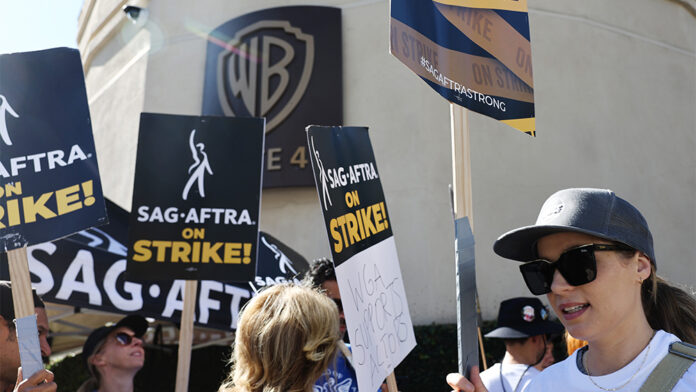On the first day of the SAG-AFTRA strike in July, union president Fran Drescher was asked how long she expected it to last.
“We’re set up to go six months if we have to,” Drescher said.
It hasn’t been that long yet. But as the strike reaches the 100-day mark on Saturday, it is already the longest actors strike involving the film and TV companies in Hollywood history.
It’s also not clear that it will be over any time soon. The Alliance of Motion Picture and Television Producers suspended negotiations on Oct. 11, and there has been, as yet, no sign of a return to the bargaining table.
SAG-AFTRA has expressed frustration over the lack of talks. Duncan Crabtree-Ireland, the union’s chief negotiator, said the 100-day milestone is a reminder of how little substantive negotiation has taken place since the strike began.
“We all will reflect on the fact that it’s been such a long time and so many of those days have been spent out on the picket lines and not in the room negotiating with the companies,” he said.
Asked if he still thought it was possible for the strike to go into January, he said, “I certainly hope it won’t be that long. But it requires two parties to talk in order for us to move things forward.”
A key question is how long SAG-AFTRA can maintain its solidarity. Drescher is now facing dissent from A-listers led by George Clooney, who went public on Thursday with an alternate plan to resolve the strike. Drescher quickly shot it down as unworkable, but the back-and-forth exposed a rift between the guild and many of its most famous members.
Union leaders are also urging members to show their support by spending just a couple hours a day on the picket lines.
The guild has also noted that the Writers Guild of America strike lasted much longer, and succeeded in getting a deal that addressed all of the union’s demands.
“The WGA triumphed after 148 hard-fought days, proof that perseverance will break the toughest barriers and result in the transformative change we need to justify everyone’s sacrifices,” the union said in a message to members.
Taken together, the two Hollywood strikes have now lasted 173 days, and the economic toll is climbing, both for actors and for below-the-line workers.
Jules Bruff, a Disney strike captain, said that members are stressed out, and some are seeking out mental health resources. But, she said that spirits remain high on the lines.
“The thing about actors is we are incredibly resilient,” she said. “We’re starting to get tired physically, but we’re resolved.”
Laurie Hendler, another captain at Disney, said that membership was reenergized when the AMPTP walked away from the table.
“I think some of us were kind of feeling like we could coast through to the end,” she said. “And the next morning we had hundreds of people out here… I think that the studios are hoping they can divide us. They’re hoping they can break us. And they’re hoping that if they take their time, we will fall apart. And the fact that there are so many of us out here shows that that’s not going to happen.”



